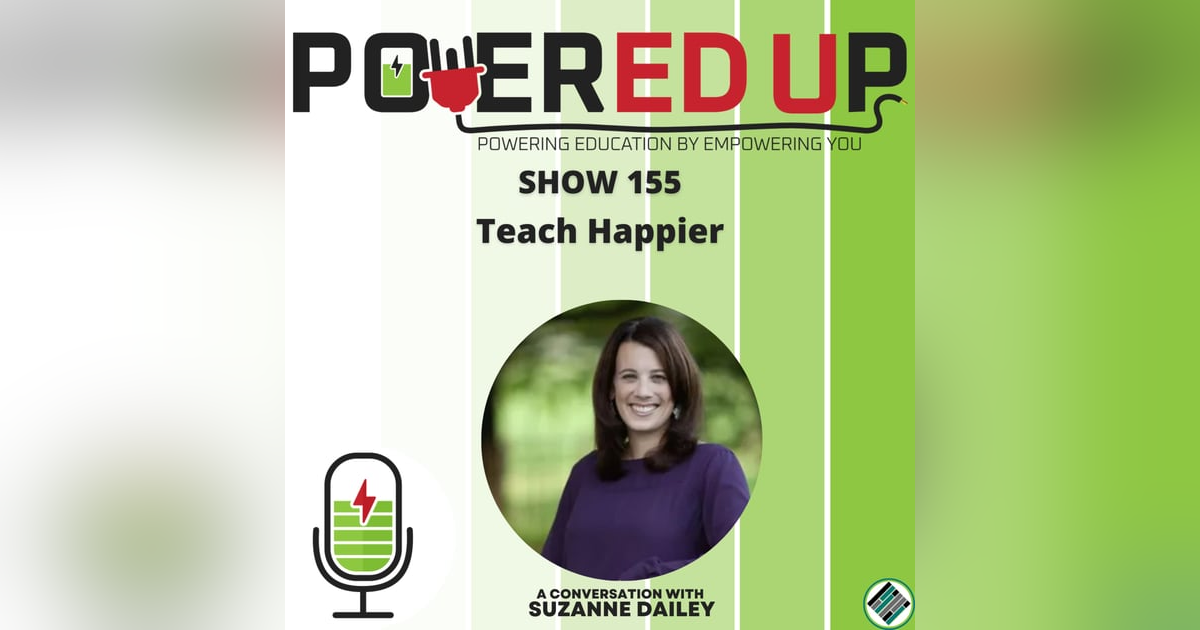155: Teach Happier

Summary
In this conversation, Suzanne Dailey, an instructional coach, shares her experiences and insights on creating a positive classroom environment, supporting multilingual learners, promoting teacher wellness, and practicing happiness as a discipline. She emphasizes the importance of validation and asking questions in coaching conversations and staying in touch with the classroom as an instructional coach. Suzanne also discusses her work in teaching happiness and the impact it has on teaching and learning. Overall, the conversation highlights the significance of creating a nurturing and empowering environment for both students and teachers. In this conversation, Suzanne Dailey shares insights and experiences from her teaching career. She discusses the importance of reflection and improvement in teaching math, gaining perspective and experience, and the value of observing other teachers. Suzanne also talks about the benefits of filming oneself for teaching and the rigorous process of National Board Certification. She highlights the cost and benefits of certification and its recognition across different states. Additionally, Suzanne emphasizes the importance of utilizing positive psychology, surrounding oneself with good people, and modeling emotional wellness. She concludes by discussing the significance of reflective practice and innovation in teaching.
Takeaways
Creating a positive classroom environment involves greeting students, setting high expectations, and nurturing relationships.
Supporting multilingual learners requires empathy, cultural sensitivity, and personalized approaches.
Promoting teacher wellness involves practicing self-care, gratitude, and maintaining healthy relationships.
Asking questions and providing validation are essential in coaching conversations to empower teachers and promote problem-solving. Reflection and improvement are essential in teaching math effectively.
Gaining perspective and experience from observing other teachers can enhance teaching practices.
Filming oneself for teaching can provide valuable insights and opportunities for growth.
National Board Certification is a rigorous process that offers professional development and recognition.
Utilizing positive psychology and surrounding oneself with good people can improve well-being and teaching effectiveness.
Modeling emotional wellness is important for creating a positive classroom environment.
Reflective practice and innovation are key to continuous improvement in teaching.
Chapters
00:00 Introduction and Background
01:20 Mrs. Daley, the Fourth Grade Teacher
03:18 Creating a Positive Classroom Environment
04:48 Challenges in Teaching
06:14 Supporting Multilingual Learners
08:32 Promoting Teacher Wellness
10:46 Teach Happier and Impact on Teaching
12:38 Practicing Happiness as a Discipline
15:00 Recognizing the Need for Self-Care
17:26 Influencing the Energy in the Room
21:44 Blending Happiness Practices into Instructional Coaching
23:46 The Importance of Validation and Asking Questions
30:48 Staying in Touch with the Classroom
36:18 Ideal Administrator Position
40:35 Teaching Math: Reflection and Improvement
41:24 Gaining Perspective and Experience
42:20 The Value of Observing Other Teachers
43:19 Filming Yourself for Teaching
45:33 National Board Certification
48:19 The Rigorous Process of National Board Certification
51:46 Cost and Benefits of National Board Certification
51:58 National Certification and Teaching in Different States
53:41 Utilizing Positive Psychology
55:24 Surrounding Yourself with Good People
57:30 Modeling Emotional Wellness
59:06 Reflective Practice and Innovation
Website: https://suzannedailey.com
Twitter: @suzannedailey
Help us out!
Help us reach new listeners on iTunes by leaving us a rating and review! It takes just 30 seconds, and instructions can be found here. Thanks! We appreciate it!
--- Support this podcast: https://podcasters.spotify.com/pod/show/poweredup/support






